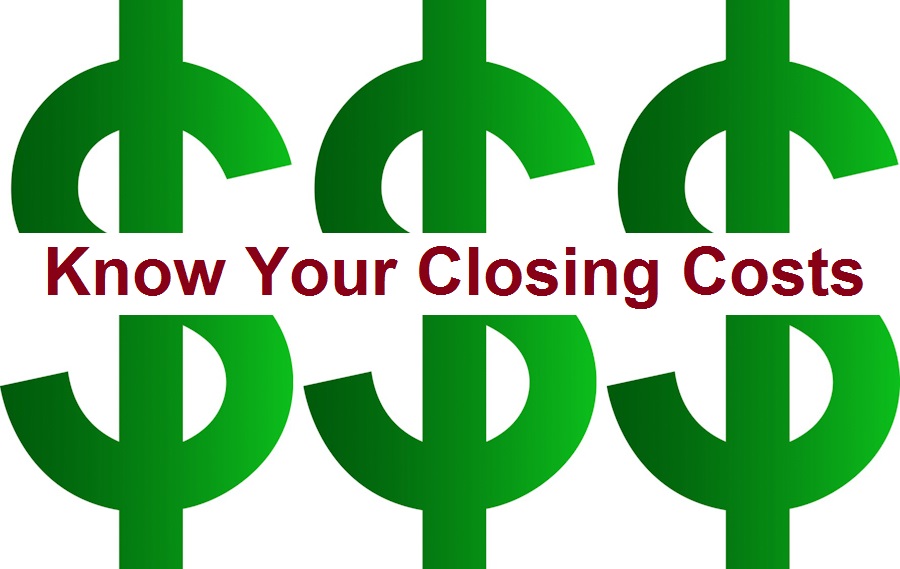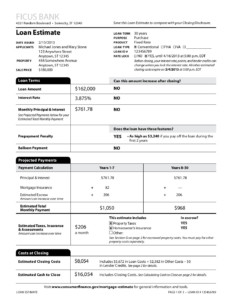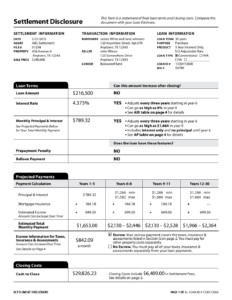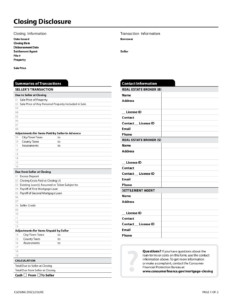Before embarking on buying or selling a home, know at least approximately what your “closing costs” will be, so you won’t be surprised later in the process. This is especially important for prospective buyers – you need to be sure you’ll have the cash available to cover your closing costs, otherwise, you will not be able to complete the purchase of a home.
So, what exactly are “closing costs”?
Sample Loan Estimate Form
(click on image for pdf)
- Your down payment, less the earnest money deposit you provided with your offer (held in escrow by the settlement company) – Your down payment is the purchase price less the amount of your mortgage loan. So, for example, if the purchase price is $500,000 and you are getting a mortgage loan for 90% of that, your down payment will be 10% – so, in this example, $50,000. And, if, say, your earnest money deposit had been $10,000, then you’d need to provide the remaining $40,000 at settlement.
Technically, your down payment isn’t really a “closing cost” – but, it will be significant, and everything else below will be in addition to this and also due at settlement.
- Mortgage/lender related charges – These include:
- Lender fees – This can vary significantly, depending on the lender and the mortgage loan program you will use. You should know upfront the fees a lender will charge you BEFORE you commit to using them. The amount can be significant.
- Appraisal – This is completed by the lender so they can be sure the house they’re providing you a mortgage loan to buy is worth the contract sale price. However, you pay for the appraisal. When you initially contact lenders to decide which you’d like to go with, ask them what you would be charged for an appraisal.
- Termite inspection – Lenders require this to ensure the house and other structures are not damaged and/or have an active infestation. To be clear, although commonly referred to as a “termite inspection,” it includes all wood-eating insects.
- Survey – Your lender may or may not require a survey. There are two types: “boundary survey” (more expensive, but exact) or a “location drawing” (less expensive, but only roughly shows where the house and other improvements are relative to the property’s boundaries). As with the appraisal, you pay for any survey. Ask upfront whether your lender will require a survey and at what cost to you.
- Escrows – Typically, your lender will want to handle, on your behalf, payment of homeowners insurance, property taxes and any HOA/condo association fees. Your lender will specify the amount of the escrow payment to be made at closing, and provide a line item breakdown.
- Title insurance – Title insurance protects against any future claims that might be made by anyone who previously may have had a financial interest in the property that was not recorded in the land records. There are two different policies you will pay for:
- Owner’s policy – This covers any loss you might experience in the future.
- Lender’s policy – This covers any loss your lender might experience in the future. You pay for your lender’s policy. If you’re not obtaining a mortgage loan (i.e., you’re paying all cash), this will not apply.
- Taxes – In Montgomery County, for example, you’ll be responsible for half of each of the following (except for county recording charges), unless you negotiate something different in the contract (nearly everything in a real estate contract is negotiable). Note: If you are a “first-time Maryland homebuyer,” you will pay no state transfer tax.
- County recording charges (paid entirely by buyer)
- County transfer tax
- State transfer tax
- State recordation tax
- Settlement fee – These is the fee you will pay to the settlement company. In Maryland, it is your right as a buyer to choose the settlement company. Ask upfront what a settlement company will charge before you select them.
At least three days before settlement, your settlement company will provide you a Closing Disclosure for buyers indicating exactly the amount of cash you will need to provide to the settlement company prior to settlement, typically either by wire transfer or bank check. The amounts indicated should be close to what your lender indicated on the “Loan Estimate” form provided to you before you submitted your offer.
Sample Closing Disclosure – Buyer
(click on image for pdf)
Finally, keep in mind that contracts can fall through (for example, the seller refuses to repair items flagged in an inspection). In such a situation, you will still be responsible for paying for items up to the point of the contract being cancelled, such as any inspections performed, and the appraisal and/or survey, if they were already completed by your lender.
- Commissions – Sellers usually pay the commissions for both their real estate agent (i.e., the “listing agent” or “seller’s agent”) and the buyer’s real estate agent.
- Taxes – In Montgomery County, for example, you’ll be responsible for half of each of the following, unless you negotiate something different in the contract (nearly everything in a real estate contract is negotiable).
- County transfer tax
- State transfer tax
- State recordation tax
- Settlement fee – These is the fee you will pay to the settlement company. In Maryland, the buyer has the right to choose the settlement company, and that will be specified in the offer contract submitted to you as the seller. Before agreeing to an offer, if you desire, you (or, your realtor) can check with the settlement company chosen by the seller to see what their fees to you would be.
At least three days before settlement, the settlement company will provide you a Closing Disclosure for sellers that indicates exactly the disposition of all funds and expenses associated with the sale of your property.
Sample Closing Disclosure – Seller
(click on image for pdf)




